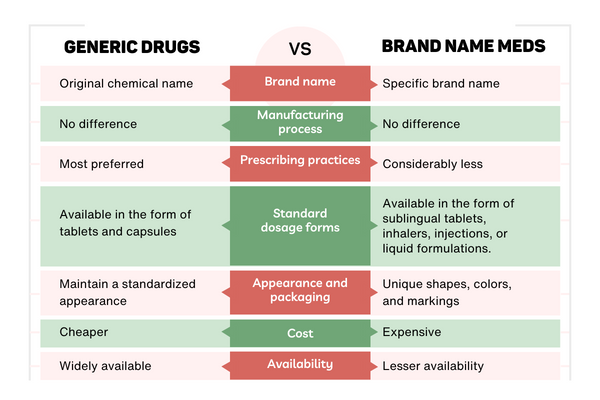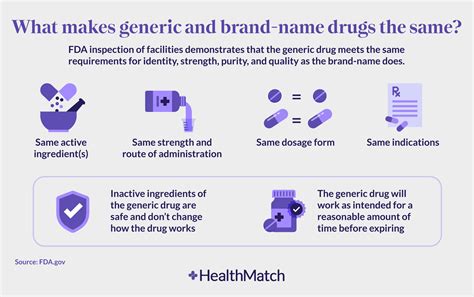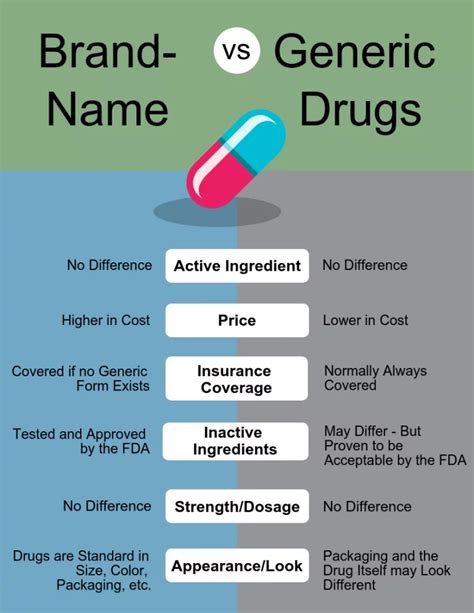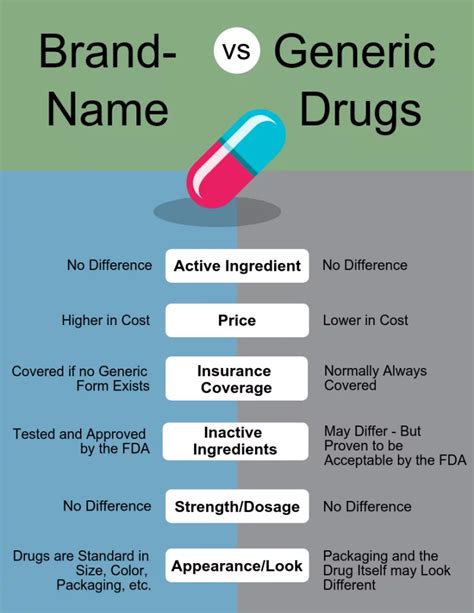Generic Vs Brand Name Drugs

The debate between generic and brand name drugs has been a longstanding one, with each side having its own set of advantages and disadvantages. For many consumers, the choice between generic and brand name drugs comes down to a matter of cost, with generic drugs often being significantly cheaper than their brand name counterparts. However, there are many other factors to consider when making this decision, including the active ingredients, dosage, and potential side effects of the medication.
One of the primary advantages of generic drugs is their lower cost. Generic drugs are typically 20-90% cheaper than brand name drugs, which can make a significant difference for individuals who are on a tight budget or who require ongoing medication. This cost savings is due in part to the fact that generic drug manufacturers do not have to invest in the research and development that brand name drug manufacturers do. Instead, they can focus on producing the medication at a lower cost, which is then passed on to the consumer.
Another advantage of generic drugs is that they are subject to the same regulatory standards as brand name drugs. In the United States, for example, the Food and Drug Administration (FDA) requires that generic drugs meet the same standards for quality, safety, and efficacy as brand name drugs. This means that generic drugs must contain the same active ingredients, have the same dosage, and meet the same standards for purity and potency as brand name drugs.
Despite these advantages, some consumers may still be hesitant to choose generic drugs over brand name drugs. One reason for this is the perception that generic drugs are of lower quality or less effective than brand name drugs. However, this perception is not supported by the evidence. Studies have shown that generic drugs are just as effective as brand name drugs, and that they have the same benefits and risks.
In fact, the FDA has a rigorous approval process for generic drugs, which includes a review of the drug’s active ingredients, dosage, and manufacturing process. The FDA also conducts regular inspections of generic drug manufacturing facilities to ensure that they meet the same standards as brand name drug manufacturers.
In addition to the cost savings and regulatory standards, generic drugs also offer a number of other benefits. For example, generic drugs can help to increase access to medication for individuals who may not have been able to afford brand name drugs. This can be especially important for individuals with chronic conditions, such as diabetes or hypertension, who require ongoing medication to manage their condition.
On the other hand, brand name drugs have their own set of advantages. One of the primary advantages of brand name drugs is their reputation for quality and effectiveness. Brand name drugs are often developed and marketed by well-established pharmaceutical companies, which can provide a level of assurance and trust for consumers. Additionally, brand name drugs may have additional features or benefits that are not available with generic drugs, such as patient support programs or educational materials.
Another advantage of brand name drugs is that they are often available in a wider range of formulations and dosages. This can be especially important for individuals who have specific needs or preferences, such as those who require a certain dosage or formulation of a medication.
Despite these advantages, brand name drugs also have some disadvantages. One of the primary disadvantages of brand name drugs is their high cost. Brand name drugs are often significantly more expensive than generic drugs, which can make them unaffordable for many consumers. Additionally, brand name drugs may have a higher risk of side effects or interactions, which can be a concern for some individuals.
Ultimately, the choice between generic and brand name drugs depends on a variety of factors, including the individual’s specific needs and preferences. While generic drugs offer a number of advantages, including lower cost and regulatory standards, brand name drugs have their own set of benefits, including reputation and additional features.
For individuals who are considering the switch from brand name to generic drugs, there are a number of things to keep in mind. First, it is essential to talk to a healthcare provider or pharmacist to determine whether a generic version of the medication is available and whether it is a good option. Additionally, individuals should be aware of any potential differences in the formulation or dosage of the generic medication, and should carefully review the label and instructions to ensure that they are taking the medication correctly.
In conclusion, the debate between generic and brand name drugs is a complex one, with each side having its own set of advantages and disadvantages. While generic drugs offer a number of benefits, including lower cost and regulatory standards, brand name drugs have their own set of benefits, including reputation and additional features. Ultimately, the choice between generic and brand name drugs depends on a variety of factors, including the individual’s specific needs and preferences.
When choosing between generic and brand name drugs, it is essential to consider a variety of factors, including cost, regulatory standards, and individual needs and preferences. By carefully evaluating these factors and talking to a healthcare provider or pharmacist, individuals can make an informed decision that is right for them.
| Drug Type | Cost | Regulatory Standards | Active Ingredients |
|---|---|---|---|
| Generic | Lower cost (20-90% cheaper) | Meets same regulatory standards as brand name drugs | Same active ingredients as brand name drugs |
| Brand Name | Higher cost | Meets same regulatory standards as generic drugs | Same active ingredients as generic drugs |

The choice between generic and brand name drugs depends on a variety of factors, including cost, regulatory standards, and individual needs and preferences. By carefully evaluating these factors and talking to a healthcare provider or pharmacist, individuals can make an informed decision that is right for them.
FAQs

What is the difference between generic and brand name drugs?
+The primary difference between generic and brand name drugs is the cost. Generic drugs are typically 20-90% cheaper than brand name drugs. Additionally, generic drugs are subject to the same regulatory standards as brand name drugs, but may have different inactive ingredients or formulations.
Are generic drugs as effective as brand name drugs?
+Yes, generic drugs are just as effective as brand name drugs. The FDA requires that generic drugs meet the same standards for quality, safety, and efficacy as brand name drugs. This means that generic drugs must contain the same active ingredients, have the same dosage, and meet the same standards for purity and potency as brand name drugs.
Can I switch from a brand name drug to a generic drug?
+Yes, you can switch from a brand name drug to a generic drug, but it is essential to talk to a healthcare provider or pharmacist first. They can help you determine whether a generic version of the medication is available and whether it is a good option for you. Additionally, they can help you understand any potential differences in the formulation or dosage of the generic medication.
Pros and Cons of Generic Drugs

- Lower cost (20-90% cheaper)
- Meets same regulatory standards as brand name drugs
- Same active ingredients as brand name drugs
- Can help increase access to medication for individuals who may not have been able to afford brand name drugs
- May have different inactive ingredients or formulations
- May not be available in all formulations or dosages
- May have a higher risk of side effects or interactions in some individuals
In conclusion, the debate between generic and brand name drugs is a complex one, with each side having its own set of advantages and disadvantages. While generic drugs offer a number of benefits, including lower cost and regulatory standards, brand name drugs have their own set of benefits, including reputation and additional features. Ultimately, the choice between generic and brand name drugs depends on a variety of factors, including the individual’s specific needs and preferences. By carefully evaluating these factors and talking to a healthcare provider or pharmacist, individuals can make an informed decision that is right for them.



